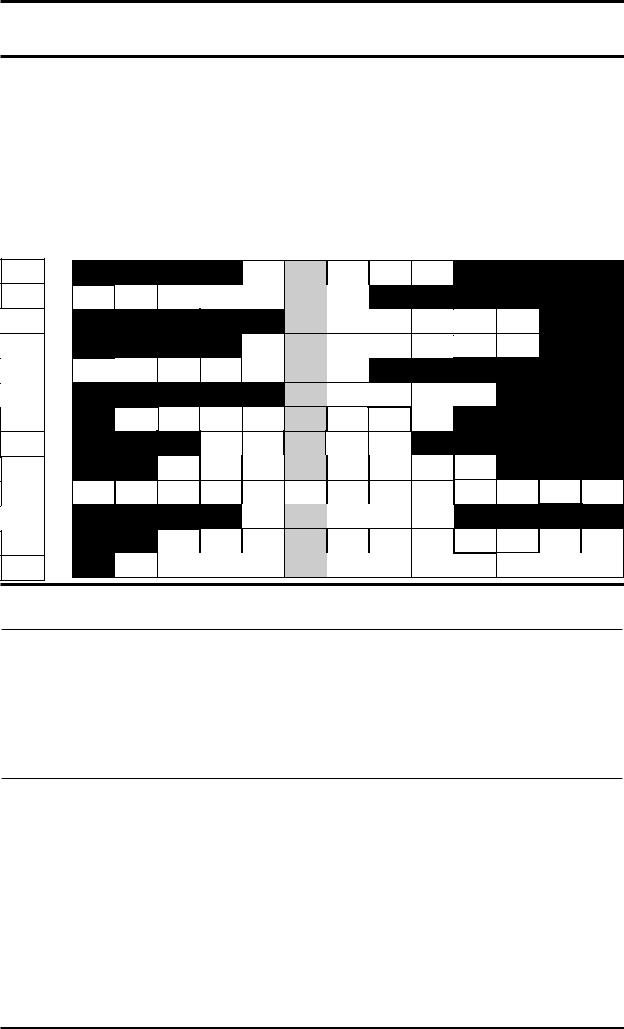
- •Introduction
- •Contents
- •General Vocabulary
- •Adjectives to nouns
- •Compound adjectives
- •Compound nouns
- •Confusing pairs and false friends
- •Contrast and comparison
- •Expressions with get
- •Human actions
- •Materials
- •Modified words
- •Noises
- •Nouns and verbs to nouns
- •Opposites 1
- •Opposites 2
- •Opposites 3
- •Prepositions
- •Shape and size
- •Spelling
- •Verbs to adjectives
- •Verbs to nouns
- •Working words
- •Accommodation
- •The arts
- •Character and personality
- •Clothes
- •Crime
- •Education
- •Food and drink
- •Free time activities
- •Geography
- •Health
- •Learning languages
- •The media
- •Money
- •Nature and the environment
- •On the road
- •Relationships
- •Services and facilities
- •Shopping
- •Sport
- •Travel and holidays
- •24 hours
- •Work
- •Answers

Crime
Task 1.
Look at this student's essay, and complete it with a word or expression from the box. In some
cases, more than one answer may be possible.
attacked • protect • property • defend • locks • lights
victims • self-defence • burgled • security • possessions • violence criminals • problem • drugs • break in • be aware • police • prevent
There is a lot of crime in our towns and cities. What do you think we could all do to reduce the risk to
ourselves and our homes?
Crime is a big 1. __________ in some cities. There is a lot of 2. __________ on the streets at night, people buy and sell 3. __________ illegally, and a lot of houses are 4. __________ on a regular basis. The
5. __________ do their best to 6. __________ these things happening, but they are not always successful.
However, there are some things that people can do to make their lives safer, to 7. __________
themselves and their 8. __________ from crime. For example, they can improve 9. __________ by fixing good, strong 10. __________ so that thieves cannot 11. __________ and steal their 12. __________. When they go out at night, they should leave 13. __________ on so that thieves think there are people at home. When they are on the streets, they should 14. __________ of what is happening around them. They could even consider doing a 15__________ course such as judo or jujitsu so that they can
16. __________ themselves if they are 17. __________ by muggers.
There will always be 18. __________ on our streets, but that doesn't mean we all need to be 19. __________ of crime, especially if we take the right preventative measures.
Task 2. Complete the sentences below with a word or expression from the box.
vocabulary specific-topic
guilty • falsified • smuggled • sentenced • tried • innocent • arrested
mugged • break • vandalized • stole • robbed • trafficking • charged
Richard Mann has been committing crimes since he was a boy.
1.When he was only 15 he _____________ telephone boxes and public toilets.
2.As he grew older, he _____________ old ladies in the street and stole their money.
55
For reference, see the Easier English Dictionary for Students (0 7475 6624 0)

topic-specific vocabulary
Crime
3.He also _____________ banks, post offices and jewellery shops.
4.On one occasion, he _____________ almost £20,000 from a post office.
5.In his late twenties, he _____________ cigarettes and alcohol from one country to another.
6.During his only proper job in an office, he _____________ the accounts and pocketed thousands of pounds.
7.He then started _____________ drugs.
8.The police finally _____________ him last year.
9.They _____________ him with almost thirty crimes.
10.He was _____________ at a Crown Court.
11.He said he was _____________, but the jury decided he was _____________.
12.The judge _____________ him to 15 years in prison.
13.He won't _____________ the law again for a long time.
Task 3. IDIOMS, COLLOQUIALISMS AND OTHER EXPRESSIONS
Complete the following story using one of the idiomatic words or expression from the box.
behind bars • |
nick • boys in blue |
• |
doing time • got away with • nicking |
spill the beans |
• hardened • cops |
• |
as thick as thieves • leg it • red handed |
Brian and Bert had always been 1._____________, sharing each other's secrets and doing everything together. They turned to a life of crime in their teens, and by the time they were in their early twenties, they were already 2._____________ criminals. They burgled houses and stole cars and always 3._____________ it, discovering that they actually enjoyed the excitement of avoiding the 4._____________. However, their luck didn't last and one day the 5._____________ caught them 6._____________ while they were 7.______________ a car. They tried to 8._____________, but didn't get too far. The police interviewed them and told them to 9._____________. I'm glad to say that Brian and Bert are now 10._____________ in Wandsworth 11._____________, and expect to be 12._____________ for at least two years.
56
For reference, see the Easier English Dictionary for Students (0 7475 6624 0)

Education
Task 1. VERBS
Look at the sentences below and fill in the gaps using the appropriate word or expression from A, B or C.
1. He got a good grade in his maths, but ________ his English exam.
A. passed B. lost C. failed
2. She had to ________ her First Certificate exam three times.
A. study B. take C. make
3. She ________ her driving test first time!
A. passed B. succeeded C. won
4. He is ________ medicine because he wants to become a doctor.
A. studying B. learning C. acquiring
5. He's ________ to speak French at college.
A. studying B. learning C. teaching
6. She's ________ herself to speak Japanese.
A. learning B. studying C. teaching
7. She ________ from Edinburgh University last year.
A. left B. graduated C. passed
8. We need to ________ young people about the dangers of alcohol.
A. educate B. bring up C. raise
9. I'm ________ for my history test tomorrow.
A. learning B. revising C. remembering
10. School ________ next week; I can't wait for the holidays to begin!
A. breaks into B. breaks up C. breaks down
11. In my country, it is ________ to go to school between the ages of 5 and 16.
A. legal B. required C. compulsory
12. My favourite ________ at school was always History.
A. topic |
B. subject |
C. object |
Task 2. NOUNS
A. Look at the definitions below, and write the words they define in the grid on the next page. The first letter of each word has been given to you. If you do it correctly, you will find the name we give to a student at university in the shaded vertical strip. Use your dictionary to help you.
1. A child at school. |
(e.g., The piano teacher thinks she is her best p_ _ _ _ ) |
2.A person who is studying at a college or university. (e.g., She's a brilliant s _ _ _ _ _ _ )
3.A diploma from a university. (e.g., She has a d _ _ _ _ _ in mathematics from Oxford University)
4.A meeting of a small group of university students to discuss a subject with a teacher. (e.g. The French s_ _ _ _ _ _ is being held in the conference room)
5. A talk given to a class of students, usually at a university or college (e.g., We are going to a l _ _ _
_ _ _ on pollution).
vocabulary specific-topic
57
For reference, see the Easier English Dictionary for Students (0 7475 6624 0)

topic-specific vocabulary
58
Education
6. |
A sum of money to help |
(e.g., Not many students get a full g _ _ _ _ ) |
|
|||
7. |
A teaching session between a tutor and one or more students. |
(e.g., We had a t_ _ _ _ _ _ _ on |
||||
Russian history) |
|
|
|
|
|
|
8. |
All the people who work in a company, school, college or other organization |
(e.g., Three |
||||
members of s_ _ _ _ are away sick) |
|
|
|
|
||
9. |
A person with a degree from a university. |
(e.g., He's a g_ _ _ _ _ _ _ of London University) |
||||
10. |
An area of knowledge that you are studying. |
(e.g., Maths is his weakest s_ _ _ _ _ _) |
||||
11. |
The points given to a student for a test or a piece of work. (e.g., She got top m_ _ _ _ in English) |
|||||
12. |
A school that is funded by the state. |
(e.g., He went to a s_ _ _ _ _ _ _ _ _ _) |
|
|||
13. |
A school for little children. |
(e.g., We send our youngest son to the local k_ _ _ _ _ _ _ _ _ _ _) |
||||
1. |
p |
2. |
s |
3. |
d |
4. |
s |
5. |
l |
6. |
g |
7. |
t |
8. |
s |
9. |
g |
10. |
|
|
|
|
|
|
|
|
s |
|
|
|
|
|
|
|
|
|
|
|
|
|
|
|
|
|
|
|
|
|
|
|
|
|
|
|
|
|
|
|
|
|
|
|
|
|
|
|
|
|
|
11. |
m |
12. |
s |
13. |
k |
B. What's the difference? Use your dictionary to help you find the difference between the following pairs of words.
1. a teacher and a professor |
4. a term and a semester |
2. a primary school and a secondary school |
5. a graduate in Britain and a graduate in the USA |
3. a fee and a grant |
6. a state school and a public school |
|
|
|
|
Task 3. IDIOMS, COLLOQUIALISMS AND OTHER EXPRESSIONS
Look at these sentences and decide which of the idioms and colloquialisms in bold is correct. In each sentence, there are two expressions which we do not use in English.
1.He gets up early to go to college, and comes home late. I keep telling him he shouldn't buy a dog with two tails / burn the candle at both ends / try to wear two pairs of trousers.
2.Sally always does her homework on time and buys the teacher little presents. The other children hate her. She's such a teacher's toy / teacher's jewel / teacher's pet.
3.He'll have to pull his socks up / polish his head / empty his washing basket and work harder or he'll fail his exams.
4.She didn't work hard enough and flunked / splodged / squidged her exams.
5.They didn't go to school, but chased the tiger / emptied their heads / played truant and went fishing instead.
6.He never comes to his English lessons. He's always smirking / skiving / shrinking.
For reference, see the Easier English Dictionary for Students (0 7475 6624 0)
